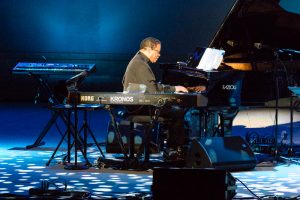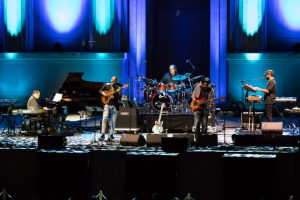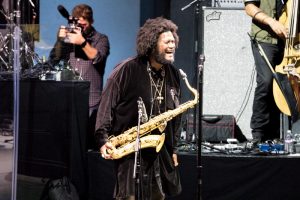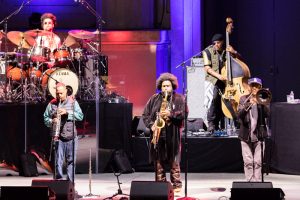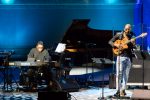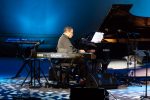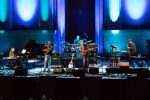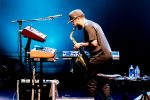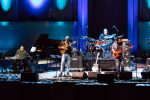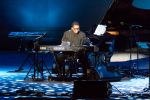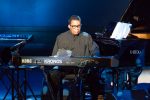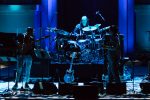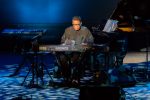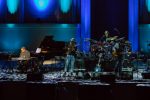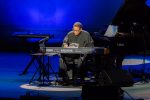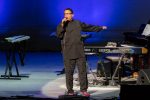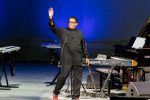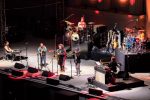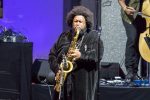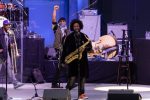REVIEW: Herbie Hancock and Kamasi Washington cavort with mythical creatures at the Greek
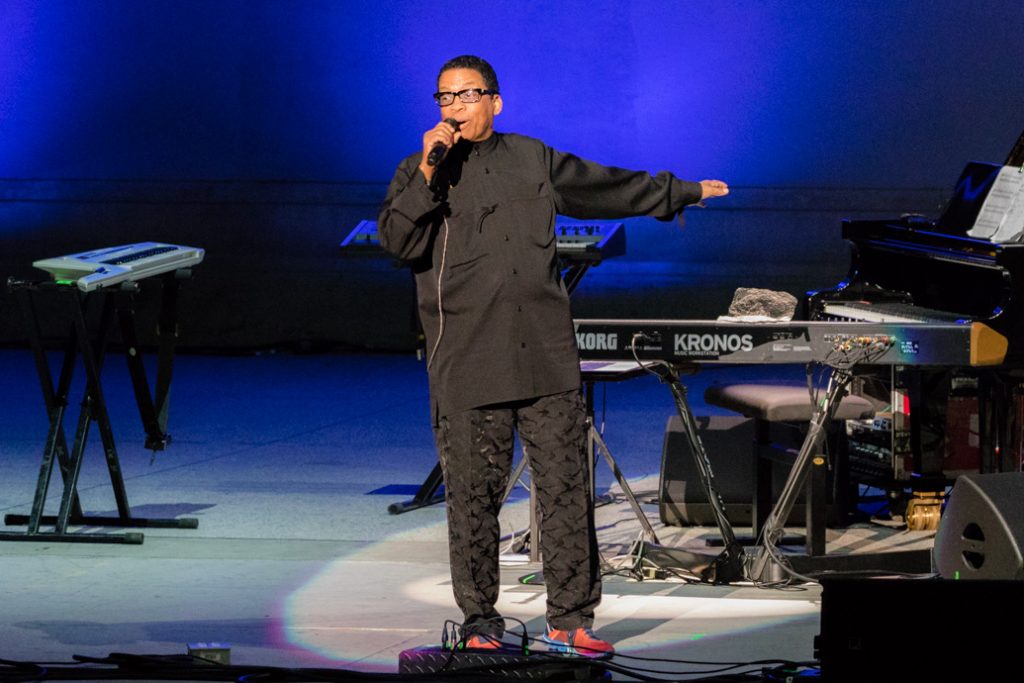
Herbie Hancock performs at The Greek Theatre in Berkeley on Aug. 23, 2019. Photos: Sean Liming.
BERKELEY — The classically grandiose Hearst Greek Theatre played host to a pair of big names in jazz Friday evening: Kamasi Washington (the genre’s biggest success story of the last five years) and Herbie Hancock (one of the most celebrated names in jazz’s past half-century).
Hancock warrants the billing. He appeals to both the casual jazz fan and the esoteric expert. His name rings a bell in the minds of both the budding musicology student and the thin-haired beatnik digging the dusty stacks of forgotten LPs. Those hoping to glimpse mythological creatures cavorting among the foreboding columns of the Greek’s impressive stage were not disappointed.
Hancock and his band materialized behind an elegant bank of keyboards and the band was underway with such subtlety and grace of musicianship it was almost hard to remember a time before they started. They opened with a conversational ensemble piece, the plenitude of instrumental voices bobbing and weaving as if at a cocktail party. While multi-instrumentalist Terrace Martin took center stage with a free-jazz saxophone tangent, Hancock’s far-out scales gently collided with themselves in the margins. It was a perfect introduction to the vastly textured sonic palette of these five expert musicians.
The was were arresting not in its bombast, but in its patience. It grabbed the audience’s attention with its keen attentiveness–one could see the five men on stage were listening to each other and feeling out their chops while fabulously dissonant chords and clashing dual pianos swirled around them. Guitarist Lionel Loueke played extensively on West African rhythms and chiming guitar leads laden with chordal accents, then soared with ‘70s rock-god sustain on his overdriven solo in “Secret Source.” Vinnie Colaiuta was phenomenal on drums, casually dashing off flawless drumrolls over unfathomable time signatures. On “Actual Proof,” from 1974’s Thrust, Hancock again indulged his liking for stutter-step descending riffs creating a polyrhythm against the drums.
The middle portion of the set was punctuated by the Bay Area vocalist Elena Pinderhughes, a special guest. The first ballad of the night featured her sweet singing and modulated flute solos. Pinderhughes effortlessly shifted among modes, fluttering from hope to melancholy and curious longing on her breathlessly tuneful showcase.
Then it was back to full-blooded, horn-driven themes lining the pockets of nuanced, laid-back funk grooves. Hancock emerged from the balladry wielding a massive silver keytar, from which he wrangled some greasy synth vibrato. He induced a wave of fan enthusiasm with the first bluesy chords of “Cantaloupe Island” and the band gave birth to another upbeat jam before returning for an encore of “Chameleon,” joined by Kamasi Washington and his brass section in a particularly funked-out rendition. Hancock, keytar in hand, signaled the wind-down with a jump and as his band waved goodnight, the spry septuagenarian bounded over monitors and coiled cables to entreat the listeners with a final message of togetherness.
“We’re all together on this boat called earth,” Hancock said. “Let’s save it together.”
In contrast to Hancock’s performance, Kamasi Washington and his band were more frenetic.
In the fading twilight, Washington took the stage wearing a flowing black robe and red sneakers, big hair recognizable even from the lawn at the top of the amphitheater. Immediately, the band launched into “Street Fighter Mas.” The rousing horn theme barely had a chance to land on the crowd before slide trombonist Ryan Porter was off and running with a heavily syncopated solo. Then Washington himself took charge with his tenor sax, erupting with salvo after salvo of funky face-melting runs while behind him the band executed a controlled disintegration into chaos, building to a turbulent crescendo. This was followed by a dynamic shift to a foreboding outro with long bowed bass notes. It was an energizing and convincing start.
The band attempted few such moments of unhinged instrumental abandon, however, as much of the material and the pacing felt meticulously controlled, with an underlying exuberance that kept bubbling to the surface and keeping the sound refreshing. There was also an added touch of sincerity laced into the performance. Washington addressed the audience before almost every song with positive messages of unity and then introduced his father, who came onstage and tore it up on the soprano sax.
Washington’s band was tight and vibrant, with standout performances from nimble-fingered bassist Miles Mosley and vocalist Patrice Quinn, who hype-danced and performed spoken-word vocals on the penultimate “Will You Sing.” Another highlight was the heartfelt and gentle groove of “Truth,” from Washington’s 2017 EP, Harmony of Difference. The band’s passionate interplay on the tune carried it above a simple two-chord pattern. For the closer, the band dipped into Washington’s 2018 opus, Heaven and Earth, with the cinematic kung-fu drama “Fists of Fury.”
Grammy-winning razz and R&B pianist Robert Glasper, who’s worked with everyone from Q-Tip to Norah Jones and Maxwell, opened the concert with a roughly 40-minute performance.
- Herbie Hancock performs at The Greek Theatre in Berkeley on Aug. 23, 2019.
- Herbie Hancock performs at The Greek Theatre in Berkeley on Aug. 23, 2019.
- Herbie Hancock performs at The Greek Theatre in Berkeley on Aug. 23, 2019.
- Herbie Hancock performs at The Greek Theatre in Berkeley on Aug. 23, 2019.
- Herbie Hancock performs at The Greek Theatre in Berkeley on Aug. 23, 2019.
- Herbie Hancock performs at The Greek Theatre in Berkeley on Aug. 23, 2019.
- Herbie Hancock performs at The Greek Theatre in Berkeley on Aug. 23, 2019.
- Herbie Hancock performs at The Greek Theatre in Berkeley on Aug. 23, 2019.
- Herbie Hancock performs at The Greek Theatre in Berkeley on Aug. 23, 2019.
- Herbie Hancock performs at The Greek Theatre in Berkeley on Aug. 23, 2019.
- Herbie Hancock performs at The Greek Theatre in Berkeley on Aug. 23, 2019.
- Herbie Hancock performs at The Greek Theatre in Berkeley on Aug. 23, 2019.
- Herbie Hancock performs at The Greek Theatre in Berkeley on Aug. 23, 2019.
- Kamasi Washington performs at The Greek Theatre in Berkeley on Aug. 23, 2019.
- Kamasi Washington performs at The Greek Theatre in Berkeley on Aug. 23, 2019.
- Kamasi Washington performs at The Greek Theatre in Berkeley on Aug. 23, 2019.
Follow photographer Sean Liming at Instagram.com/S.Liming.

